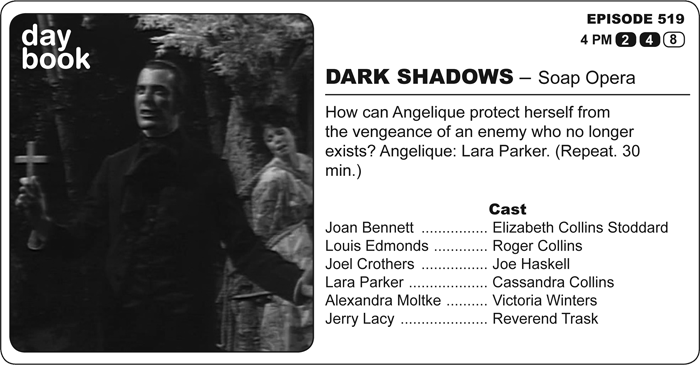
By PATRICK McCRAY
Taped on this date in 1968: Episode 521
Roger is astounded that Barnabas knew to look for Liz in the tower room, and Julia reports that his sister will survive her suicide attempt. Her request that Liz be taken to Windcliff is refused. Barnabas and Julia wonder if Angelique is truly gone. After hearing breathy silence on the phone when they try to call Stokes, they go to his home. Stokes has been harboring/tutoring Adam, who answered the phone but said nothing. Hiding Adam, Stokes tells Barnabas and Julia that the state of the missing painting of Angelique may betray her current status. Barnabas rifles Roger’s bedroom with no luck, and as he comes downstairs, a knock at the door reveals a dapper, composed gentleman: Nicholas Blair -- Cassandra’s brother.
Want to see Roger bring up Barnabas’ most uncomfortable memory so incessantly that the ex-vampire looks like he’s ready to give up and confess everything? Want to see Barnabas and Julia responding to what seems like Professor Stokes picking up the phone with an outgoing obscene phone call? Want to see Stokes kvetch to Adam about academic politics as if he’s confiding in someone who knows what he’s talking about rather than a barely articulate side of meat? Want to see Barnabas sneaking around Roger’s bedroom, snooping for a forbidden portrait of Angelique as if he were Chico in need of a Harpo in ANIMAL CRACKERS? Finally, want it to end with a demon who sounds like
Don Adams, claiming to be family?
Welcome to 521.
These are skilled writers, and skilled writers dealing with repetitive and deliberately slow storytelling will quickly become bored writers. If you look carefully, DARK SHADOWS has a surprising propensity to verge on farce when it’s not (and even when it is) resounding drama. The actors seem in on it. As Roger goes on and on about the legends of someone trapped in the tower room, and how curious it was the Barnabas just knew that Liz would be up there, the image stays fixed on the 1795 portrait. It’s as if the audience owes
Dan Curtis money, and he paid the camera crew to assault them with irony until they pony up the scratch. But I wouldn’t have it any other way. If you want subtle, you’re watching the wrong show. Except….
Jonathan Frid nails it. After Roger innocently remarks about Barnabas’ curiously coincidental knowledge for the seventy-eighth time in the scene, the camera lingers on Frid. This is a man with more nervous and uneasy expressions than any other actor since Thespis, and he invents an entirely new one here. It’s a strange mixture of terror and an intense desire to confess. Holding in the truth, he looks like a vegan struggling not to tell everyone about his dietary ethos. Unlike with the vegan, Barnabas’ restraint wins out. But you can tell he’s closer to “I’ve had it” than at any other time in the series, so far.

Roger is beloved for his 70mm, Sensurround displays of aristocratic obliviousness, and the writers give him a moment so rich that I am amazed anyone kept a straight face. Julia gently suggests that Liz, who narrowly avoided suicide by nightshade while claiming to be the 18th century mother of an undead Barnabas Collins, might benefit from some professional consultation. His indignant response? “Are you suggesting my sister is mentally ill?” Well, Roger, um, exactly when do you begin to suspect that the meds are off? I ask that without judgement. I just want to know.
The wackiness continues as Barnabas and Julia suddenly remember that they know an occult expert and call Professor Stokes. When Adam answers with silence, Jonathan Frid and
Grayson Hall make Olympian efforts not to smirk as they remark that all they can hear is heavy breathing. Cutting to Adam, we see that he’s holding the receiver upside down, indicating that the heavy breathing is coming from his ear. I would tell you to draw your own conclusions, but I have no conclusions to suggest. When they visit Stokes, he hides Adam like Jack Tripper hiding a girl from Mr. Roper, and even tries bribing Barnabas with cheese… a temptation the svelt Canadian nimbly avoids… to keep him from poking around in his bonus room. But Barnabas is determined to poke, but thankfully saves it for Roger’s bedroom. To find the painting. The painting of Angelique. That’s all. I swear. As Julia distracts Roger with board games. It kind of works until Nicholas Blair shows up, announcing himself as Cassandra’s brother.
The recent events have been such an avalanche of normalized absurdity that, although Nicholas is unexpected, he’s in no way out of step with the two episodes leading up to his grand entrance. Especially since, moments before, Roger was speaking about Cassandra’s lack of relatives with a conspicuous portentousness that made every word sound as if it were written in italics.
If I sound hard on the episode, I’m anything but. The writers and cast are clearly cutting a rug, and manage to upstage THE CAROL BURNETT SHOW (freshly on the air) while never straying from their own ground rules. DARK SHADOWS, quite intentionally, can be a very funny show. Intentionally and, yes, I swear it, subtly.
Fill in the sad observation about
Tim Burton, here. As Don Adams -- who sounds a lot like Nicholas Blair -- might have said, “Missed it by that much.”
This episode hit the airwaves June 25, 1968.
































